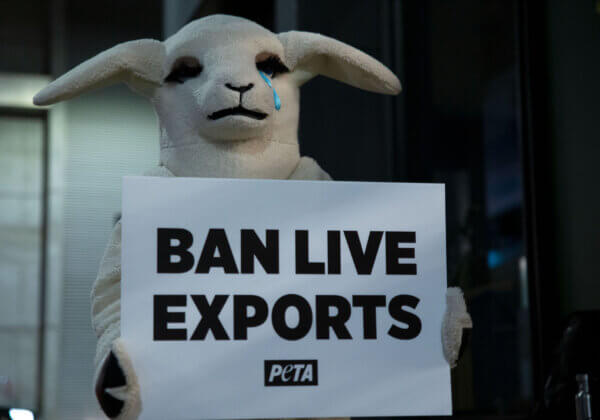How Cows’ Milk SHOULD Be Labelled
We all know that the dairy industry is in deep crisis as prices plummet, but now we’re witnessing signs of terminal panic: it’s trying to ban the word “milk” from soy, almond, rice, oat, and any other non-dairy milk which doesn’t fill its shrinking coffers.
The panic is justified – the demand for plant-based milks in Australia has increased rapidly, and these products now make up 10 percent of milk sales.

What is “milk”? The industry has asked to have an unjustified monopoly over the word by redefining it as “a mammary secretion of animals”.
So PETA proposes this label for milk that’s taken from animals:

The fact of the matter is that most dictionary definitions actually mention that milk is meant “for the nourishment of [animals’] young”. This definition is inconvenient for the dairy industry, which steals animals’ milk from their babies.
On dairy farms, male calves and some female calves are killed shortly after birth, and the remaining female calves are added to the herd to suffer the same fates as their mothers: to be used as milk-making machines. Once their milk production wanes, after being artificially inseminated again and again, they’re shipped to the abattoir far short of their natural lifespan.
Another dictionary definition of milk is to “[e]xploit or defraud by taking small amounts of money over a period of time” – this is evident in the industry’s claims that non-dairy milks are nutritionally inferior to its mammary secretions.
In fact, quite the opposite is true.
For a start, at least two-thirds of adults have trouble digesting lactose, the sugar found in dairy products. They often experience bloating, gas, cramps, vomiting, headaches, rashes, and asthma.
Dairy products are also known to increase a person’s chances of developing heart disease, diabetes, cancer, and many other ailments. Large-scale studies have shown that rather than preventing osteoporosis, milk may actually increase women’s risk of getting the disease, because the consumption of too much saturated fat and vitamin A can weaken bones.
Fortified plant-derived milks provide calcium, vitamins, iron, zinc, and protein and do not contain any cholesterol.
They are a healthier choice and don’t contribute to the massive environmental damage caused by animal agriculture or the misery of millions of gentle, intelligent cows.






